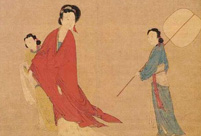

Over the past decade, Africa has increasingly turned to China for development support and experience, boosted in part by growing diplomatic ties.
China has provided grants, funded large infrastructure projects and extended loans to many African countries for development projects.
Over the years, however, more African nations have come to expect the Chinese government to finance much of the continent’s growing development needs through grants.
Ambassador Lin Songtian, the director general of African Affairs at the foreign affairs ministry meets with journalists in Suzhou. (Photo/Taddeo Bwambale)
Ambassador Lin Songtian, the director general of African affairs at the foreign affairs ministry says instead of grants, China will encourage its firms to invest in Africa and provide preferential loans.
“In the past, our African friends would come to China for grants assistance. But grants cannot meet all their demands for industrialisation and agricultural modernisation,” Lin Songtian says.
“China will instead create an enabling environment and open doors for companies to invest overseas,” he explains in an interview with African journalists on a visit to the city of Suzhou.
In 2015, President Xi Jinping unveiled a $60b fund to help Africa fast-track its development vision, with emphasis on addressing the continent’s bottlenecks of infrastructure, funding and skills.
Of the funding package, $5b will be in form of grants, $35b as preferential loans, export credits, and concessional loans. Another $5b will go to the China-Africa Development Fund, an equity arm of the China Development Bank meant to fund Chinese businesses to invest in Africa.
An extra $5b will cater for a Special Loan for the Development of African SMEs and $10 will form the initial capital for the China-Africa Production Capacity Cooperation Fund.
China remains Africa’s largest trade partner with trade volumes from both sides exceeding $279b in 2015, and Africa is now China’s second largest contracts market.
Last month, during follow-up meetings of the Johannesburg Summit of the Forum on China-Africa Cooperation (FOCAC) in Beijing, over 250 agreements worth $50.7b were signed.
The agreements signed by Chinese firms and African governments cover planned projects in infrastructure, manufacturing, finance, energy, agriculture, pharmaceuticals and ICT sectors.
According to Lin Songtian, over 91% of the agreement sum will cater for direct investment by Chinese firms in Africa and commercial loans from China’s top financial institutions.
“Direct investment is more important than grants assistance. Grants can cater for capacity building but infrastructure requires a lot of capital,” he explains.
The proposed projects, however, must be ‘productive and sustainable’ in order to attract investment from Chinese firms, Lin says.
Unlike in the past when the Chinese government was the driver of China-Africa cooperation, Ambassador Lin says this time the key player will be the market.
Massive infrastructure projects around Suzhou. (Photo/Taddeo Bwambale)
Concessional loans
Rather than seek concessional loans from the Chinese government, African governments are encouraged to interact with financial institutions to extend credit for bankable projects.
With the new arrangement comes a shift from concessional loans guaranteed by the Chinese government to commercial loans negotiated directly by Chinese financial institutions.
“To acquire a concessional loan, it takes a very long procedure. But for a commercial loan, all you will need is to show how you will pay back,” Lin Songtian elaborates.
Lin Songtian advises that loans should be used for investment in critical areas like industrial parks that employ people and can generate income to repay the loans.
The shift in China’s development support structure appears to be driven in part by China’s apparent discomfort with the handling of past credit by some African countries.
In one case, one African leader is said to have approached the Chinese government for a new loan while at the same time asking that the existing loan be written off.
Lin says China cannot allow African governments to get loans ‘as they like’ since it can create a new debt crisis and create a financial burden for them.
He says China is ready to share with Africa its experience and skills that have guided its transformation from a poor country to the world’s second largest economy.
In Suzhou, where Lin Songtian interacted with the press team that is on a 10-month exchange programme in China, investment in infrastructure and industrial parks has paid dividends.
Beautiful scenery around Suzhou Industrial Park. (Photo/Taddeo Bwambale)
At least 104 African ministers visited the iconic Suzhou Industrial Park that sits on 248sqkm of land that was a rice field just 22 years ago and now has GDP exceeding $80b.
Apart from support for infrastructure and agricultural modernization, China says it will maintain support for Africa across 10 cooperation areas, among them education, health and security.
 Spectacular bridge with one of the tallest piers in the world
Spectacular bridge with one of the tallest piers in the world Magnificent view of Hukou Waterfall
Magnificent view of Hukou Waterfall A glimpse of Stride 2016 Zhurihe B military drill
A glimpse of Stride 2016 Zhurihe B military drill US Navy chief tours Liaoning aircraft carrier
US Navy chief tours Liaoning aircraft carrier Chinese American woman wins Miss Michigan
Chinese American woman wins Miss Michigan Centenarian couple takes first wedding photos
Centenarian couple takes first wedding photos Traditional Tibetan costumes presented during fashion show
Traditional Tibetan costumes presented during fashion show How did ancient people escape the summer heat
How did ancient people escape the summer heat Breathtaking scenery of Hulun Buir grassland
Breathtaking scenery of Hulun Buir grassland Top 10 livable Chinese cities
Top 10 livable Chinese cities Top 20 hottest women in the world in 2014
Top 20 hottest women in the world in 2014 Top 10 hardest languages to learn
Top 10 hardest languages to learn China’s Top 10 Unique Bridges, Highways and Roads
China’s Top 10 Unique Bridges, Highways and Roads Risk management key to peace at sea
Risk management key to peace at sea  Wannabe actors in China's Hollywood
Wannabe actors in China's Hollywood  Horton displays no goodwill in remarks over his rival
Horton displays no goodwill in remarks over his rival  China’s athletes in Brazil only dine on meals prepared by Chinese chefs
China’s athletes in Brazil only dine on meals prepared by Chinese chefs Day|Week